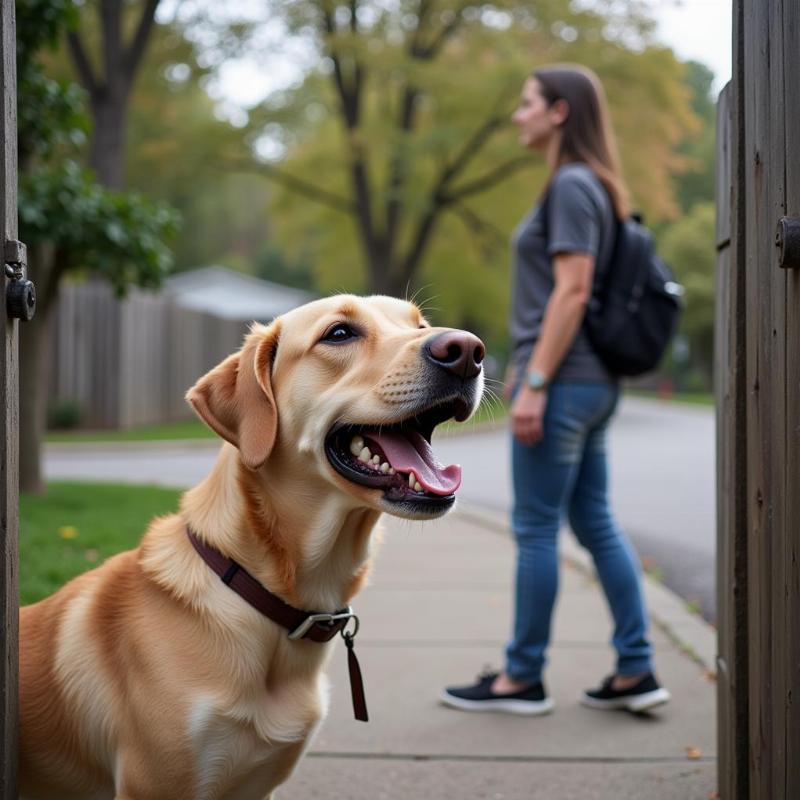Barking at strangers is a common canine behavior, often stemming from territorial instincts, fear, or excitement. While some barking is natural, excessive barking can be disruptive and problematic. This guide will provide you with practical, effective strategies on how to teach a dog not to bark at strangers, promoting a calmer, more sociable companion.
Understanding the Reasons Behind Barking
Before tackling the barking, it’s crucial to understand why your dog barks at strangers. Is it fear-based, a protective response, or simply over-excitement? Identifying the root cause will help you tailor your training approach for optimal results. For example, a fearful dog requires a different approach than a dog barking out of excitement. Observe your dog’s body language – a tucked tail, flattened ears, and wide eyes often indicate fear, while a stiff posture, raised hackles, and a forward stance might suggest aggression.
Desensitization and Counter-Conditioning: A Gradual Approach
Desensitization and counter-conditioning are effective methods for managing barking at strangers. This involves gradually exposing your dog to strangers at a distance where they don’t bark, then pairing the presence of the stranger with something positive, like a tasty treat. As your dog becomes comfortable, gradually decrease the distance. Consistency is key to this method, so be patient and persistent.
The “Quiet” Command: Teaching a Verbal Cue
Teaching your dog the “quiet” command gives you a verbal tool to interrupt barking. When your dog starts barking, say “quiet” in a firm, calm voice. If they stop barking, even momentarily, immediately reward them with a treat and praise. Repeat this process consistently. Over time, they will associate the command with ceasing the barking behavior.
Distraction Techniques: Redirecting Their Focus
Distraction can be a powerful tool to interrupt barking. Keep a favorite toy or a puzzle treat handy. When you anticipate a stranger approaching, redirect your dog’s attention to the toy or treat. This helps shift their focus from the stranger to something more engaging.
 Dog Barking at Strangers
Dog Barking at Strangers
Positive Reinforcement: Rewarding Desired Behavior
Positive reinforcement is the cornerstone of effective dog training. Instead of punishing barking, focus on rewarding quiet behavior. When your dog remains calm and quiet in the presence of a stranger, lavish them with praise, treats, and affection. This encourages them to repeat the desired behavior.
Socialization: Early Exposure is Key
Early socialization plays a vital role in preventing barking at strangers. Expose your puppy to a variety of people, places, and sounds from a young age. Positive experiences with strangers during puppyhood will help them develop into confident, well-adjusted adults, less prone to fear-based barking.
Seeking Professional Help: When to Consult a Trainer
If you’re struggling to manage your dog’s barking, consider consulting a certified professional dog trainer. A trainer can assess your dog’s individual needs and develop a tailored training plan. They can also help you identify any underlying anxieties or behavioral issues contributing to the barking.
Conclusion: Patience and Consistency are Key
Teaching a dog not to bark at strangers requires patience, consistency, and a positive approach. By understanding the underlying reasons for the barking and utilizing the strategies outlined in this guide, you can help your dog become more comfortable and confident around strangers, fostering a harmonious environment for both your dog and your community. Remember, the goal isn’t to eliminate barking entirely, but to manage it effectively.
FAQ:
-
How long does it take to train a dog not to bark at strangers? The timeframe varies depending on the dog’s age, temperament, and the consistency of training. It can take weeks or even months to see significant improvement.
-
What should I do if my dog barks aggressively at strangers? Consult a certified professional dog trainer or a veterinary behaviorist for guidance. Aggression requires specialized training techniques.
-
Is it ever okay to punish a dog for barking? Punishment is generally ineffective and can worsen anxiety and aggression. Focus on positive reinforcement methods instead.
-
Can older dogs learn not to bark at strangers? Yes, older dogs can learn new behaviors. While it might take more time and patience, it’s definitely achievable.
-
Are certain breeds more prone to barking at strangers? Some breeds are naturally more vocal than others. However, training and socialization can significantly influence barking behavior regardless of breed.
-
What if my dog barks at strangers only when they approach our home? This likely stems from territorial instincts. Desensitization and counter-conditioning are particularly effective in this scenario.
-
Should I use bark collars to stop my dog from barking at strangers? Bark collars can be aversive and may exacerbate anxiety. It’s best to explore positive reinforcement methods first.
Related Articles:
how to make your dog stop barking at strangers
i’ve tried everything and my dog won’t stop barking
do cockapoo dogs bark a lot
why does my dog talk to me so much
Beautdogs.us is your premier online resource for expert dog care advice, breed information, and top-quality products tailored to the American dog lover. Whether you’re a seasoned dog owner or just starting your journey, Beautdogs.us empowers you with the knowledge and resources to provide exceptional care for your furry friend. From understanding how to teach a dog not to bark at strangers to navigating the nuances of different breeds, we’re here to support you every step of the way. Connect with us today for personalized advice and explore our curated selection of products. Email: [email protected], Phone: +1 501-555-7529. Visit Beautdogs.us for more expert tips and resources.